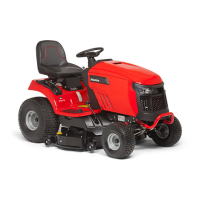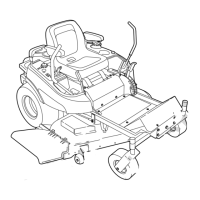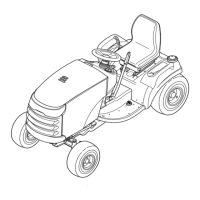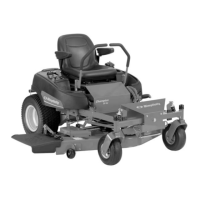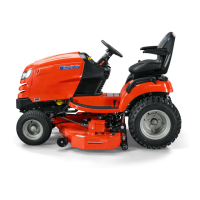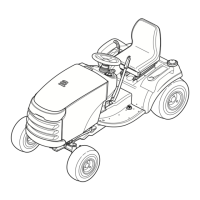36
Specifications
ENGINE
Briggs & Stratton
Model Professional Series™ w/EFM
Horsepower 27 Gross HP @ 3400 +/- 100 rpm
Displacement 44.2 cu in. (724 cc)
Electrical System Alternator: 16A Reg.
Battery: 12 Volt, 340 CCA
Oil Capacity 64 oz (1,9 L)
Engine Oil Synthetic 5W30
Spark Plug Torque 180 in-lbs (20 Nm)
CHASSIS
Fuel Tank Capacity 3.6 gal (13,6 L)
Front Wheels Tire Size: 16 x 6,5-8
Ination Pressure: 12-14 psi (0,82-0,96 bar)
Rear Wheels Tire Size: 23 x 10,5-12
Ination Pressure: 10 psi (0,68 bar)
Suspension Suspension Comfort System™ (if equipped)
TRANSMISSION K66
Type Hydrostatic Tu Torq
Hydraulic Fluid 10w30 Standard
Speeds Forward: 0-5.6 MPH (0-9,0 km/h)
@ 3400 rpm Reverse: 0-3.8 MPH (0-6,1 km/h)
Continuous Torque 216 ft-lbs (292,8 Nm)
Output
TRANSMISSION K66AP
Type Hydrostatic Tu Torq
Hydraulic Fluid 10w30 Standard
Speeds Forward: 0-7.2 MPH (0-11,6 km/h)
@ 3400 rpm Reverse: 0-5.0 MPH (0-8,0 km/h)
Continuous Torque 216 ft-lbs (292,8 Nm)
Output
MOWER
Width of Cut 52" (132 cm)
Number of Blades 3
Base Deck Platform Side Discharge
Cutting Height 1.0 and 3.75 in. (2,5 and 9,5 cm)
Cutting Positions Innite/EHOC
Parts and Accessories
Contact an authorized dealer.
Power Ratings
The gross power rating for individual gasoline engine models is labeled in accordance with SAE (Society of Automotive
Engineers) code J1940 Small Engine Power & Torque Rating Procedure, and is rated in accordance with SAE J1995.
Torque values are derived at 2600 RPM for those engines with “rpm” called out on the label and 3060 RPM for all others;
horsepower values are derived at 3600 RPM. The gross power curves can be viewed at www.BRIGGSandSTRATTON.
COM. Net power values are taken with exhaust and air cleaner installed whereas gross power values are collected
without these attachments. Actual gross engine power will be higher than net engine power and is aected by, among
other things, ambient operating conditions and engine-to-engine variability. Given the wide array of products on which
engines are placed, the gasoline engine may not develop the rated gross power when used in a given piece of power
equipment. This dierence is due to a variety of factors including, but not limited to, the variety of engine components
(air cleaner, exhaust, charging, cooling, carburetor, fuel pump, etc.), application limitations, ambient operating conditions
(temperature, humidity, altitude), and engine-to-engine variability. Due to manufacturing and capacity limitations, Briggs &
Stratton may substitute an engine of higher rated power for this engine.
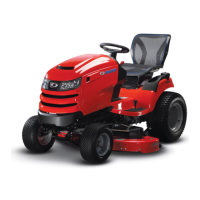
